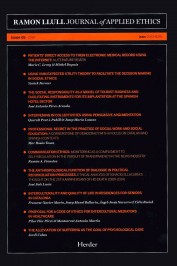USING VNM EXPECTED UTILITY THEORY TO FACILITATE THE DECISION MAKING IN SOCIAL ETHICS
Article Sidebar

Main Article Content
Yanick Farmer
Université du Québec à Montréal
The overall objective of this article is to demonstrate that in applied ethics, certain problems related to decision-making are easier to resolve using conceptual tools borrowed from mathematics than by using philosophical ethics theories, such as classical utilitarianism. With the help of a case study, the first part of the article will attempt to point out that if an agent bases his reasoning on the verbal and purely qualitative concepts of the classical utilitarian theory, he will find himself confronting “undecidable” dilemmas for which making a specific choice rather than another, becomes almost arbitrary. The second part of the article proposes a more formal quantification of utility and attitude towards risk that can help the agent to overcome the uncertainties emanating from a strictly qualitative perception of the real world’s configuration, which ends up confusing his practical judgment. This method for decision-making is inspired by the works of Howard Raiffa, John von Neumann and Oskar Morgenstern.
Paraules clau:
Social ethics, Decision making, Quantification, Risk, Expected utility
Article Details
Com citar
Farmer, Yanick. “USING VNM EXPECTED UTILITY THEORY TO FACILITATE THE DECISION MAKING IN SOCIAL ETHICS”. Ramon Llull Journal of Applied Ethics, vol.VOL 1, no. 5, pp. 23-40, https://raco.cat/index.php/rljae/article/view/283949.
Biografia de l'autor/a
Yanick Farmer, Université du Québec à Montréal
Assistant professor of the Department of Social and Public Communication at Université du Québec à Montréal.Articles més llegits del mateix autor/a
- Yanick Farmer, Marie-Ève Bouthillier, Marianne Dion-Labrie, Céline Durand, Hubert Doucet, Public participation in national preparedness and response plans for pandemic influenza: toward an ethical contribution of public health policies , Ramon Llull Journal of Applied Ethics: No 1 (2010): Issue 1